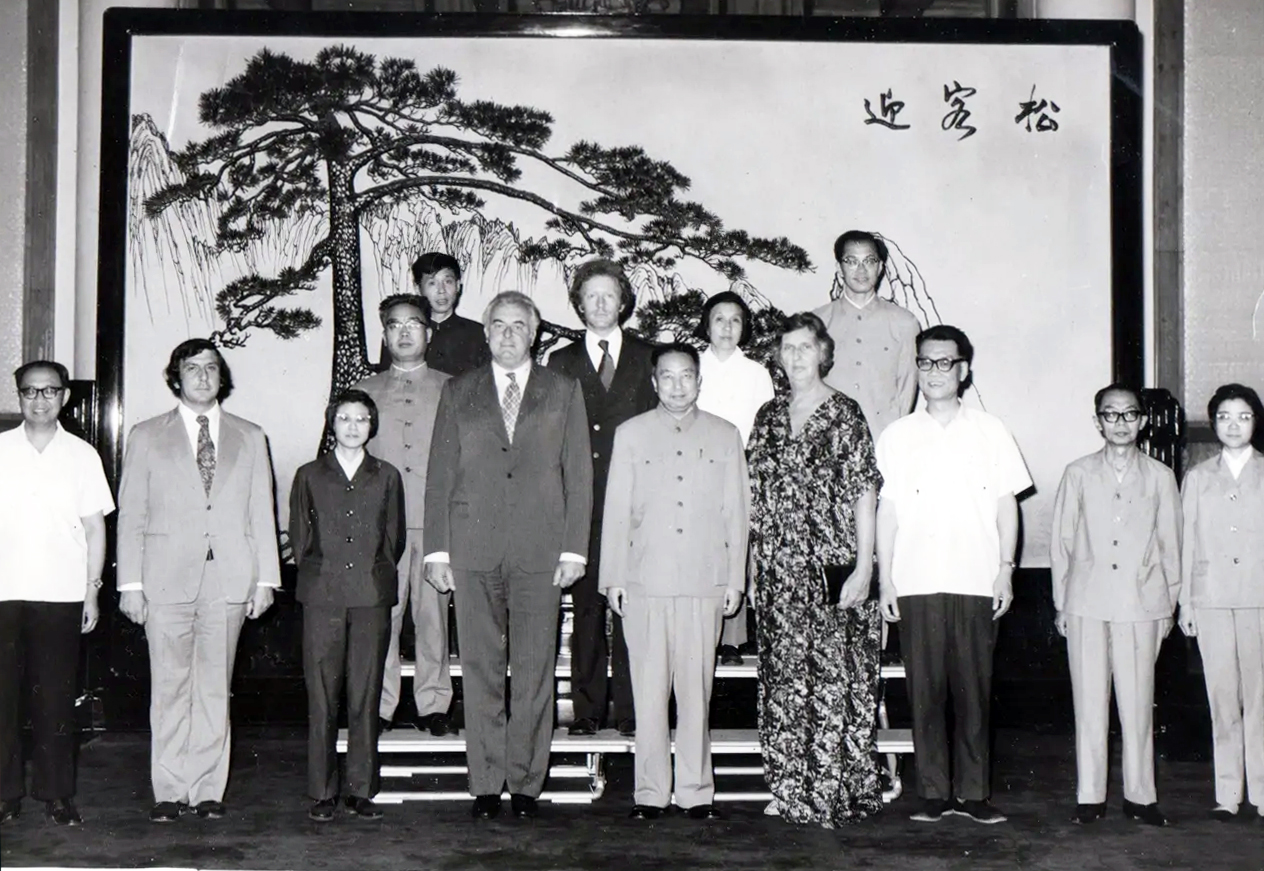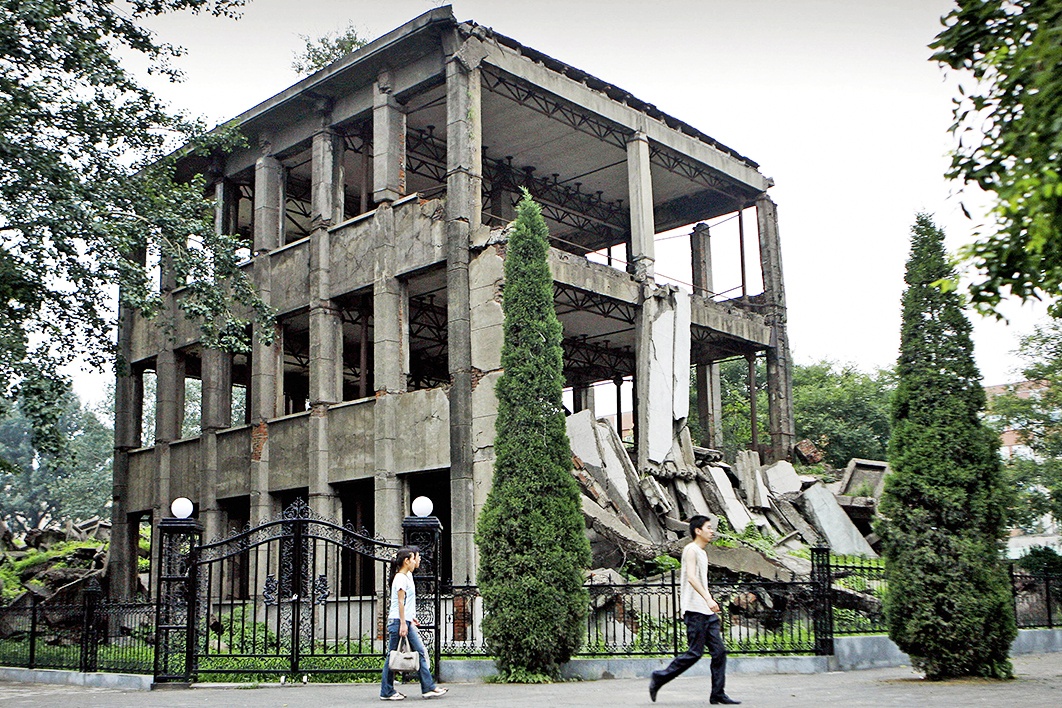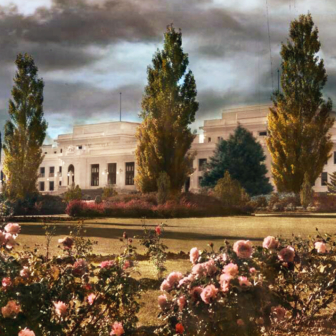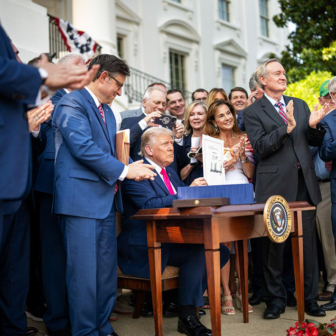By the last week of July 1976 we’d ticked off thirteen of the sixteen countries on Gough and Margaret Whitlam’s grand six-week world tour. I was the last-minute replacement bag carrier on what was effectively Whitlam’s farewell circuit — six months after he’d lost the prime ministership — and we were heading now for China.
We left Bucharest, changed planes in Tehran and watched the sun rise over the Himalayas en route to Beijing. Little could we imagine what lay in store.
Gough Whitlam had a special place in China’s foreign relations. He was among the first Western political leaders to advocate recognising the country’s communist regime, and had first visited, in 1971, prior to being elected prime minister. Australia recognised China after Whitlam won government in 1972, and he made a prime ministerial visit in 1973.
This time around Whitlam would be meeting Hua Guofeng, who was already being referred to as Chairman Hua even though he wouldn’t officially take over the country’s leadership from Mao Zedong until later in 1976.
While the generosity of the Chinese hospitality and the reverence for Whitlam were everything we’d anticipated, the meeting with Hua proved to be something of a circus. Ultimately, we waited in our hotel well into the night of 26 July, our last in Beijing, before the call finally came. We — Gough, Margaret, ambassador Stephen Fitzgerald (whom Whitlam had appointed as our first ambassador to China), and a couple of Chinese officials — piled into the motorcade and headed off to meet the new head of the biggest country on the planet.
On arrival, there was more waiting, in a sort of anteroom. When the doors were finally opened for our audience with Hua, I could see, beyond the official photographer reloading his camera, the delegation before us being ushered out a door on the other side of the room. It was 3am on this production line and there was just enough time for a handshake and a couple of official pictures.

Photo call: Chinese leader Hua Guofeng (centre) with Gough and Margaret Whitlam. Stephen Fitzgerald is second from the left, and the author is to the left of Hua in the back row.
The day after our very late-night photo shoot, we were scheduled to go to Tientsin. The circumstances I’m about to describe will explain why I can’t recall some of the collateral detail — including our reason for going there. Perhaps it was because of the city’s historical significance as Beijing’s longstanding port. In modern times, it has hosted the annual International Carpet Fair, which was on when we visited, but I’m guessing Gough and Margaret were more interested in the history than the carpets.
Stephen Fitzgerald was with us, along with some other staff from the Australian embassy and a large crew from the Chinese foreign office. After the hour’s drive from Beijing we booked into a hotel that was reasonably modern by the standards of most of the buildings in Tientsin. Inside, on each of its ten floors, a row of twenty rooms faced the street, separated by a long hallway from those facing the back. Our delegation was assigned most of the top floor; the Whitlams were across the hallway from my room, and one room down.
After dinner, wherever it was, we returned to our rooms. I went to bed, a little exhausted from waiting up till the early hours the night before.
At about 3.45am on the morning of 28 July, forty-three years ago today, I was woken by a very loud banging noise. It proved to be coming from the hinged, heavy steel windows to the room, which I’d left ajar because it was a warm night. They were swinging wildly and crashing against their frames.
This hit my consciousness in the same nanosecond that I realised the whole room was swaying. Chairs were tumbling around, the light fittings were falling out of the ceiling, the mirrors and pictures off the walls. Outside the windows I could see what seemed at first like lightning and hear what sounded like thunder.
In one movement, I rolled out of the bed and onto the floor, pulling the bedclothes over me for protection from the debris. I can’t be sure of this, but I think, somehow, I also pulled the mattress on top of me.
The banging and crashing subsided and was replaced by an even more alarming noise, the sound of the building swaying and groaning with what felt like increasing intensity. Surely it was going to reach a point in its oscillations where it would tumble over. And we were on the tenth floor.
I lay there until things calmed down a little. The groaning gave way to a gentler creaking. I pulled on a pair of pants, and shoes with no socks, and wrapped a blanket around my head and shoulders. I remembered someone once telling me that the bathroom is the safest place in an earthquake. I went in there for a while, but it seemed a little pointless. I needed to find the Whitlams and the rest of the delegation.
I went to the door of my room and stuck my head into the hallway. Fitzgerald was standing in the doorway to his room, next to mine, opposite the Whitlams’ room. “Stay under the door arch,” he advised. I did, for a moment, but that wasn’t going to get me to the Whitlams’ room.
By the time I headed across the hall, less than five minutes after I’d been woken, the Whitlams had opened their door. A wardrobe at the end of their bed had fallen over and Margaret had been badly cut on the leg. Gough had wrapped a towel around the wound. He’d also packed his briefcase, complete with the newspapers he’d been reading.
Margaret and Gough were dressed and ready to move when the Chinese officials emerged from the darkness further down the hall, some of them, fortunately, with torches. We needed to get out quickly, they said; the building might still collapse, particularly if an aftershock were to strike. I can’t recall the Chinese word for “aftershock,” but I heard it plenty of times that day; the locals were deeply unnerved by the thought. There was no time to pack belongings (theirs or ours): just leave, now, quickly, as you are. It sounded like a good plan.
The bad news was that the fire escape, the only way out, was at the other end of the building, the full length of the hallway. The even worse news, as we discovered, was that the building had split in half, clean down the middle. (We learned later that it had been designed to do that, to release the tension built up by the swaying.)
We needed to step across a sixty-centimetre chasm, in the dark, to get from our rooms to the fire escape. The drop was ten floors, punctuated by the shredded steel reinforcement of the concrete floors, but we all managed to get across. Walking down ten flights, in just enough light to see huge cracks in the walls and debris all over the stairs, was another challenge, particularly for Margaret with her injured leg.
We eventually emerged onto a crowded street among an agitated and confused throng. Before long we were led to a soccer stadium a couple of blocks away. There, we joined thousands of people from all over the world, delegates to the carpet festival, standing in the middle of a football pitch.
Perhaps another hour later, still in darkness, our party was separated from these newfound friends and transported by car to an old, disused building that once had been home to the British consulate. This single-storey, very solid structure, surrounded by beautiful gardens, was on the outskirts of Tientsin, and the Chinese had already set up an emergency processing and medical centre there.
Margaret Whitlam took her tetanus shot and stitches like the trouper she always was, and the discussion turned to how to get us back to Beijing in a hurry. We were due to fly to Tokyo that night and it was clear the Chinese would rather have us on that plane than hanging around any longer than necessary in the chaos.
There was only one problem. Under pressure from the Chinese officials to leave the hotel as quickly as possible, we’d brought nothing at all with us. No bags, no briefcases and… no passports. The Whitlams’ and mine were all back in my hotel room.
Not that I’d even thought about them in the panic, but I now figured that, in the circumstances, we could probably complete the rest of the trip — Tokyo, Manila and back to Sydney — on emergency papers. Nobody else agreed, particularly Gough. He had a puzzling determination to have the rest of his stuff retrieved from the hotel as soon as possible.
Who was going to return to that busted building, climb ten floors up the crumbling fire escape, walk the length of the corridor, jump the chasm, and retrieve the bags?
Well, it seemed, I was. I didn’t notice any of the Australian embassy staff putting their hands up.
By now it was daylight. The Chinese team swiftly decided that the most junior among them would accompany me. (They had some stuff in their rooms, too.) I had never seen, have never since seen, and hope never to see again what I saw as we drove back to the hotel. Row after row of buildings had completely collapsed. Whatever bodies had been dragged out of them were lying on the footpaths, loosely covered by sheets. In a twenty-minute trip I saw thousands of dead.
The young Chinese guy sitting next to me in the back seat, brainwashed and doctrinaire, said, “Chairman Mao say, ‘Fear not hardship neither death.’” He was as scared as I was, but it helped us both and I’ve never forgotten it.
We pulled up outside the hotel, which was set well back from the road with a big public square at the front of it. There it was, split clean down the middle, with a huge crowd looking on in awe (either because it had survived, or in expectation that it would collapse as soon as an aftershock hit).
At this point, my journalistic instincts were trumped by my sense of diplomatic sensitivity. I had brought my camera with me. I could have sold the shot of that hotel for thousands. I would be among the first Westerners out of China after the quake, assuming we made the plane to Tokyo that night.
But I sensed, and it proved to be the case, that our hosts were intensely ashamed of what had happened. I looked at Mao’s acolyte and put my camera away.
As my buddy and I made our way across the square and into the building, a huge murmuring arose from the onlookers. The prospect of an aftershock was on everyone’s mind. In we went, up the fire escape, along the hall and over the chasm; we grabbed our stuff and left the building via the fire escape for the second time in about six hours.
When we emerged after about thirty minutes, passports, briefcases and other belongings in hand, the crowd gave us an ovation. It seemed like a mixture of relief that we’d made it out and wonder that we’d been so stupid as to go back in.
Back at the old British consular residence the Chinese put a convoy together for us and we headed back to Beijing. Again, we saw more bodies in the street, roads buckled into lumps of bitumen a metre high, and railway lines twisted like spaghetti.
The Tangshan earthquake appeared for many years in the Guinness Book of Records as the greatest natural disaster in modern history, with an estimated 750,000 lives lost (and as many again injured). Given what I saw that morning, the figure is easy to believe. The 7.6-scale quake was felt more than 1000 kilometres from its epicentre, Tangshan, which was about one hundred kilometres from where we’d been sleeping.
The Chinese government took many years to issue an official count of the casualties. That number seems to have reached 242,000. China was “opening up,” guardedly, in 1976. The government wanted the world to know of its achievements, and its own people to remain convinced that a state-controlled economy and society was superior to those into which they would soon have more sightlines.
Consistent with my instinct not to take a photograph of the hotel (let alone the carnage I’d seen elsewhere on the streets), the government felt embarrassed and humiliated that buildings and vast amounts of infrastructure — especially the coalmines around Tangshan — had completely collapsed under the earthquake’s force.
Worse still, at the time, China was internationally renowned as a leader in the scientific study and prediction of earthquakes, and very proud of it. Nobody, nothing, had predicted what happened in the early hours of 28 July. It emerged later that Chinese seismologists didn’t even know of the existence of the faultline under Tangshan.
For me, that was the only time in my life that I’ve confronted real danger. It haunted me for many years afterwards, especially if I fell asleep on a flight and was woken by turbulence. For the Whitlams, the episode was lightened by the Age’s cartoonist, Peter Nicholson, who depicted Gough and Margaret in bed, evidently post-coitus, with Margaret asking, “Did the earth move for you, too, dear?”
And Gough’s inexplicable eagerness to retrieve all his belongings from the hotel room? The story goes that he might have been given something he definitely shouldn’t have had: notes on the visit that his successor as prime minister, Malcolm Fraser, had made to China the previous month. •
This story comes from The Trip of a Lifetime on richardwhitington.com.




